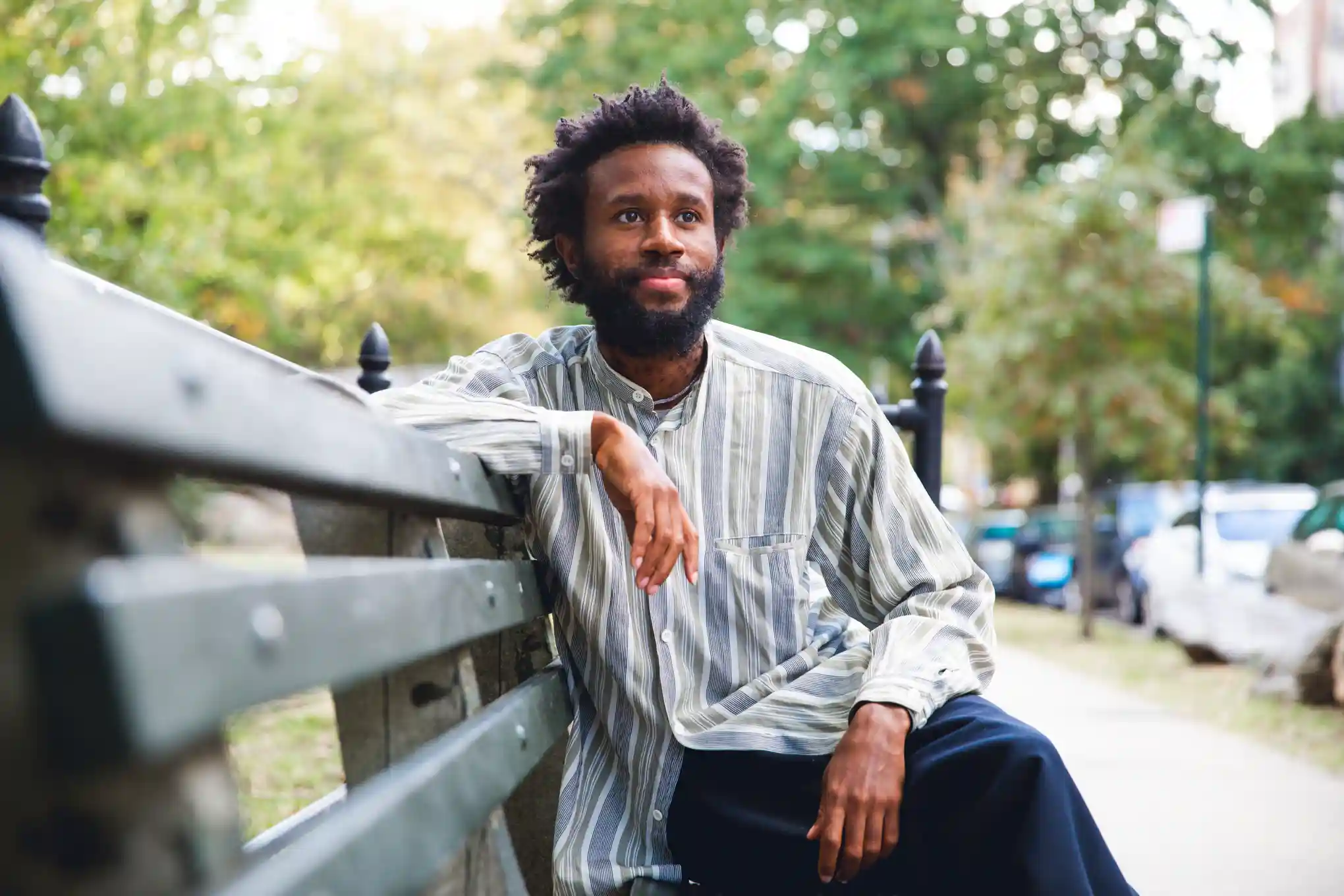The Guardian
JJJJJerome Ellis


Please don’t finish JJJJJerome Ellis’s sentences. The New York composer, producer, multi-instrumentalist and writer, who has a stutter – hence the repetition of Js in his name – asks for patience from whoever he is in conversation with. “Sometimes people just walk away,” he says. “Perhaps because I didn’t adhere to t-t-the choreography t-t-that we are often used to.” These kinds of experiences have left him feeling extremely vulnerable, he tells me candidly over a video call. “So much of the pain comes from not feeling fully human. Not feeling intelligent. People thinking that I might be evading a question.” This reality is most apparent to Ellis whenever he is stopped by police. “I don’t want my Blackness to come off as a threat and I don’t want my stuttering to come off as evidence of lying.”
Ellis is interested in bringing awareness to this intersection of stuttering (that he also calls disfluency) and Blackness. His latest project The Clearing is a profound and richly textured 12-track album with an accompanying book, that blends spoken word and storytelling with ambient jazz and experimental electronics to create a soundscape that is both meditative and theatrical. It weaves personal narratives, such as the audio of a bookseller hanging up the phone on him after he can’t get his words out, with historical accounts such as a story of enslaved Africans overcoming their captors via music. It first started life as an essay in the Journal of Interdisciplinary Voice Studies and later transfigured into a musical voyage. “I was interested in the role that clocks and watches played o-o-on plantations in the antebellum south. How slave masters deliberately did not let enslaved people own [them], as a way o-o-of domination and control,” says Ellis, who wanted to find the connective tissue between this history, and how ableism disadvantages people with speech impediments because they don’t adhere to certain flows of time. In Ellis’s poetic but political artwork, disfluency instead becomes a means to exist outside of ordinary time, as defined by a white-dominated world.
Once he finished the essay, he began experimenting musically. “I had some sounds that I had been making in Ableton with piano, saxophone, flutes and trap-influenced drums.” Ellis has a glottal block – his stutter isn’t in stammered syllables but rather silences caught in the throat (try saying “uh oh” but not being able to go beyond the “uh”). The album captures these blocks in a way that turns them into their own instrument or artistic material; he isn’t ashamed of his disfluency and asked for his stutters to be acknowledged in these interview quotes. “On the album, I feel safe stuttering because it’s just me. I have the opportunity to score my own stutter. That felt very liberating.”
Ellis was born in Connecticut, but was raised in Virginia Beach. His mother is Jamaican and his father is Grenadian. “I grew up in a very Christian household,” he says. His earliest memories are of playing music at church with his late grandfather. “He was a reverend and had a storefront church in Brooklyn,” he recounts. “When he preached, it was so intensely musical. Sometimes he would explicitly break into song, and the peaks and valleys of his speech were so dramatic. On the album, I wanted to embrace that kind of interweaving of speech and music.” His grandfather also introduced him to opera and classical music, while his father showed him “reggae, and calypso and soca”. By the age of 13, Ellis began playing the saxophone.
In 2011, he obtained a BA in music theory and ethnomusicology from Columbia University and in 2015, he was awarded a Fulbright Fellowship to research samba in Salvador, Brazil. He has presented work at the Lincoln Center and has been the subject of a This American Life episode. “I just started teaching at Yale this fall. I love it,” says Ellis, who now works in the sound design programme. “One of my goals as a teacher is to create a space where we feel as free as we can. We are able to experiment, able to be vulnerable, able to improvise together. Both musically, but also how we are learning.”
The concept of “clearing” for Ellis, is a way of encouraging “experiments with freedom”, as written by Saidiya Hartman in her historical study of early 20th-century Black women, Wayward Lives, Beautiful Experiments. “Her combination of scholarly rigour and lyrical language” is something Ellis aspires to. Other inspirations include the composers Steve Reich, Bach and John Coltrane: “All three of them have such vision and are not afraid of length.”
The album has been a source of healing for Ellis in depathologising his disfluency, but it’s also been a channel for him to connect with something far greater than himself. There’s a line in the track titled Stepney, where the speaker Milta Vega-Cardona, discussing Ellis’s stutter, says:
You create a non-linear time continuum,
and access to the ancestors,
Both for you and the listener.
You are a conduit
“I’m so grateful to [Vega-Cardona] for offering that,” says Ellis. “It’s something I’ve felt for a long time but never had the words for; that the stutter has a s-s-spiritual dimension.”
Ellis was made for speaking. Even in our brief encounter, his storytelling is deeply absorbing; and as displayed on the album it opens up portals to histories and sensitivities that are impossible to forget. “Thinking back to my grandfather. He would be telling a story about Moses and it would take him 30 minutes to get through those five verses because he w-w-would tarry and linger and spin inside verses and say them over and over again and sometimes just say one [phrase] like ‘he saw, he saw, he saw’. For me, in the congregation, it opened up this window on to something else.”